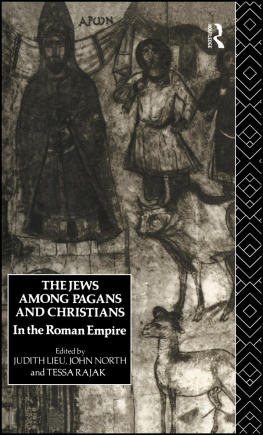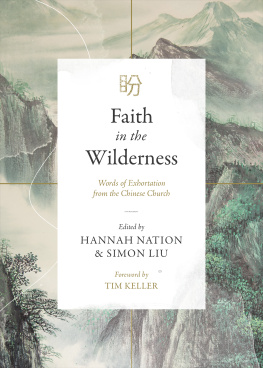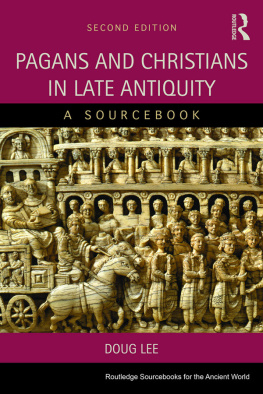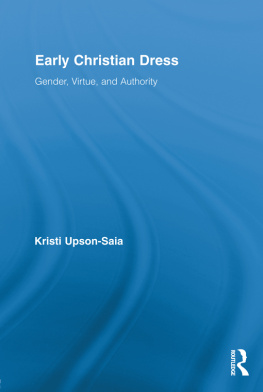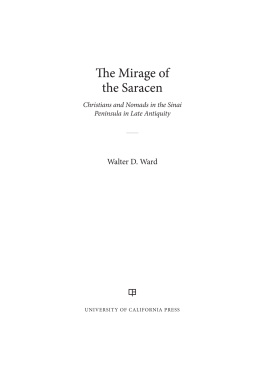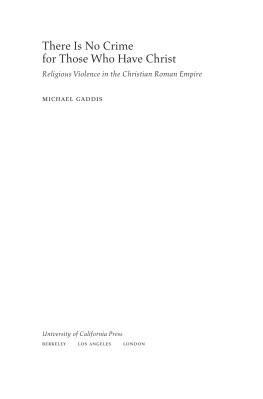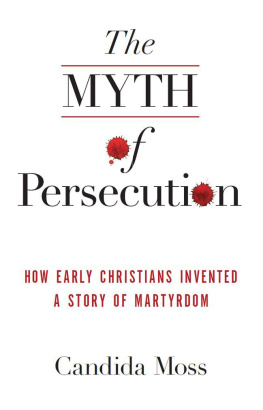
Heirs of Roman Persecution
The subject of this book is the discourse of persecution used by Christians in Late Antiquity (c. 300700 CE).
Through a series of detailed case studies covering the full chronological and geographical span of the period, this book investigates how the conversion of the Roman Empire to Christianity changed the way that Christians and para- Christians perceived the hostile treatments they received, either by fellow Christians or by people of other religions. A closely related second goal of this volume is to encourage scholars to think more precisely about the terminological difficulties related to the study of persecution. Indeed, despite sustained interest in the subject, few scholars have sought to distinguish between such closely related concepts as punishment, coercion, physical violence, and persecution. Often, these terms are used interchangeably. Although there are no easy answers, an emphatic conclusion of the studies assembled in this volume is that persecution was a malleable rhetorical label in late antique discourse, whose meaning shifted depending on the viewpoint of the authors who used it.
This leads to our third objective: to analyze the role and function played by rhetoric and polemic in late antique claims to be persecuted. Late antique Christian writers who cast their present as a repetition of past persecutions often aimed to attack the legitimacy of the dominant Christian faction through a process of othering. This discourse also expressed a polarizing worldview in order to strengthen the group identity of the writers community in the midst of ideological conflicts and to encourage steadfastness against the temptation to collaborate with the other side.
ric Fournier is Professor of History at West Chester University of Pennsylvania.
Wendy Mayer is Associate Dean for Research and Professor at University of Divinity, Australian Lutheran College.
Heirs of Roman Persecution
Studies on a Christian and Para-Christian Discourse in Late Antiquity
Edited by ric Fournier and
Wendy Mayer
First published 2020
by Routledge
2 Park Square, Milton Park, Abingdon, Oxon OX14 4RN
and by Routledge
52 Vanderbilt Avenue, New York, NY 10017
Routledge is an imprint of the Taylor & Francis Group, an informa business
2020 selection and editorial matter, ric Fournier and Wendy Mayer; individual chapters, the contributors
The right of the editors to be identified as the authors of the editorial material, and of the authors for their individual chapters, has been asserted in accordance with sections 77 and 78 of the Copyright, Designs and Patents Act 1988.
All rights reserved. No part of this book may be reprinted or reproduced or utilised in any form or by any electronic, mechanical, or other means, now known or hereafter invented, including photocopying and recording, or in any information storage or retrieval system, without permission in writing from the publishers.
Trademark notice : Product or corporate names may be trademarks or registered trademarks, and are used only for identification and explanation without intent to infringe.
British Library Cataloguing-in-Publication Data
A catalogue record for this book is available from the British Library
Library of Congress Cataloging-in-Publication Data
A catalog record has been requested for this book
ISBN: 978-0-8153-7512-8 (hbk)
ISBN: 978-1-351-24069-7 (ebk)
Typeset in Times
by Deanta Global Publishing Services, Chennai, India
Contents
RIC FOURNIER
ELIZABETH DEPALMA DIGESER
NATHANIEL MOREHOUSE
MAIJASTINA KAHLOS
BYRON MACDOUGALL
ADAM PLOYD
MATTIAS BRAND
RIC FOURNIER
SAMUEL COHEN
RIC FOURNIER
MOLLY LESTER
REBECCA STEPHENS FALCASANTOS
JASON OSEQUEDA
CHRISTINE SHEPARDSON
RYAN W. STRICKLER
WENDY MAYER
The present volume draws its origins from two panels I organized on the theme of Persecutions of Christians after Constantine: Polemic and Rhetorical Discourse, presented at the annual meeting of the North American Patristics Society, Chicago, on May 26, 2016. It includes revised versions of all papers from these sessions (ric Fourniers introduction, Nathaniel Morehouse, Adam Ployd, Rebecca Falcasantos, Jason Osequeda, Tina Shepardson, Ryan Strickler, and Wendy Mayers conclusion), in addition to the chapters we commissioned scholars (Elizabeth Digeser, Maijastina Kahlos, Byron MacDougall, Mattias Brand, Samuel Cohen, and Molly Lester) to write in order to ensure a broader coverage of the late antique period. All chapters have gone through a process of double-blind peer review. Of course, it is impossible to be comprehensive and exhaustive in a volume of this sort, and this was never our goal. Rather, we aimed to include contributions on times and places covering a representative span of the late antique period in order to present meaningful analyses of the discourse of persecution that will, hopefully, lead to more discussions on this important topic. In the end, while we regret the absence of analyses of numerous topics (e.g., Justinians reign), we can only conclude by hoping that it will inspire scholars to take on further analysis of the late antique discourse of persecution.
ric Fournier
I wish to thank all of the contributors to this volume for their hard and constantly prompt work. It has been a pleasure to work with this team of engaging and dedicated scholars. In addition to my usual procrastination, purchasing a house, organizing a wedding, and undergoing knee surgery conspired to make the editing of this book a longer process than it should ever have taken. I therefore also thank all of the contributors for their patience during this process. Wendy Mayer deserves my gratitude for accepting to co-edit this volume with me and for offering crucial support at important junctures along the way. Her calm and steady hand guided this ship to its final harbor. I particularly thank Sam Cohen and Molly Lester for stepping up at the last minute and saving the day by accepting to write chapters in a very short time to replace two contributors who had to withdraw from the project. They both must be commended for their extraordinary ability to work efficiently under a tight deadline and, for Molly, under trying physical circumstances. I also thank a humbling host of friends and colleagues who contributed to this volume in various and significant ways: Nicholas Baker-Brian, Todd Berzon, Phil Booth, Erica Buchburger, Mark DelCogliano, Rebecca Devlin, Geoff Dunn, Hal Drake, Jan Willem Drijvers, Jen Ebbeler, Susanna Elm, Richard Flower, Geoffrey Greatrex, Erika Hermanowicz, Julia Hillner, Nathan Howard, Eduard Iricinschi, Young Kim, Michael Mass, Arietta Papaconstantinou, ric Rebillard, David Maldonado Rivera, Alan Ross, Jeanne-Nicole Saint-Laurent, Maria Marcos Sanchez, Jeremy Schott, Tina Sessa, Mark Tizzoni, and Jamie Wood. Michael Greenwood was supportive of this project from the start, and his editorial assistant, Dana Moss, promptly answered all of my queries while remaining flexible during the editing process. My student at West Chester University (WCU), Ben Popp, compiled the index at the end of a trying semester, and I thank the members of the Drayer Endowment committee of the history department at WCU for funding Bens work. I cant help but have a thought for Tom, and wish that he could have seen this. His presence throughout the pages of this book is a reminder of his profound influence on my own thinking as a historian and how much he is missed. Finally, I thank Sara, for putting up with my work, for having too much fun all the time, and for being there for me no matter what.


